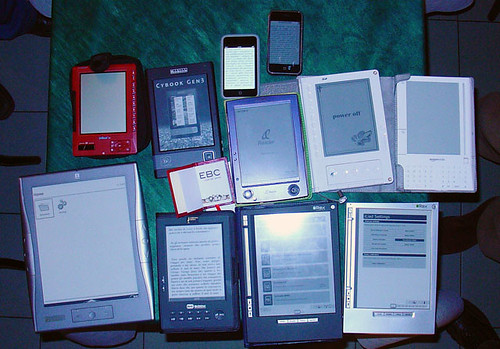
cc licensed flickr photo shared by antonio.tombolini
We just closed one of our NMC Two Minute Surveys– these have been fun to do over the last few months; we set them tightly as 3 questions, all with multiple choice answers done in Google Forms (makes it easy to us the generated chart summaries, though I wish they gave better access to the generated charts).
These are not really projected as being definitive, and it is more like taking a pulse more than anything.
This last one was on eBooks — we had 217 people respond to the survey and I just posted results at http://www.nmc.org/2minute-survey/ebooks. Not surprising that many people have not read an eBook this year (38%), though the largest response for those that did was in the 205 eBooks read range, and 11% read more than 10 eBooks last year:

Most people reported reading eBooks on their computers, though the Kindle had a quarter of the use among our respondents, even more if you count the 14% who said they use the Kindle iPhone/iPod Touch app.

But the most interesting part was where we tried to gauge what people think is an appropriate price for an eBook – most people feel that they should be priced well below the print versions:

That doe snot seem to be the pricing structure of Amazon Kindle titles. I recently bought one to try out, and it was really only about $2 or $3 less than the paperback. I only got it (a) to try the Kindle iPhone app and (b) cause I dont have shelf space.
What goes into the pricing of an Amazon Kindle book? As I read Chris Anderson’s Free the cost of digital goods approaches zero as the cost of distribution digitally keeps dropping.
Therefore, I can only assume that Amazon’s WhispetSync technology must run fueled by diamond studded gold plated squirrels. Either that, or the cost of cutting down forests and printing books on paper has gotten really dirt cheap.
I cannot find any other conclusion except someone is piling on costs that have nothing to do with the actual costs.


I feel the same way (as the responders) but I also take that feeling to audio books. I like traditional (I shake my head even having to type that) books much more than any other forms (audio, e-, etc.) so if I’m going to pay for something that is in my opinion an inferior product, it should be cheaper.
Keep in mind that these are just my consumer-minded opinions.
You can bet that the greater difference between production cost and sale price for e-books is *not* going back to the author!
Then again, from what I understand of the publishing industry, the profit margin on actual books is razor-thin, and in fact in some cases they are losing propositions. Maybe over-pricing e-books is how the publishers are taking in enough funds to keep printing plain old paper books that don’t pay for themselves.